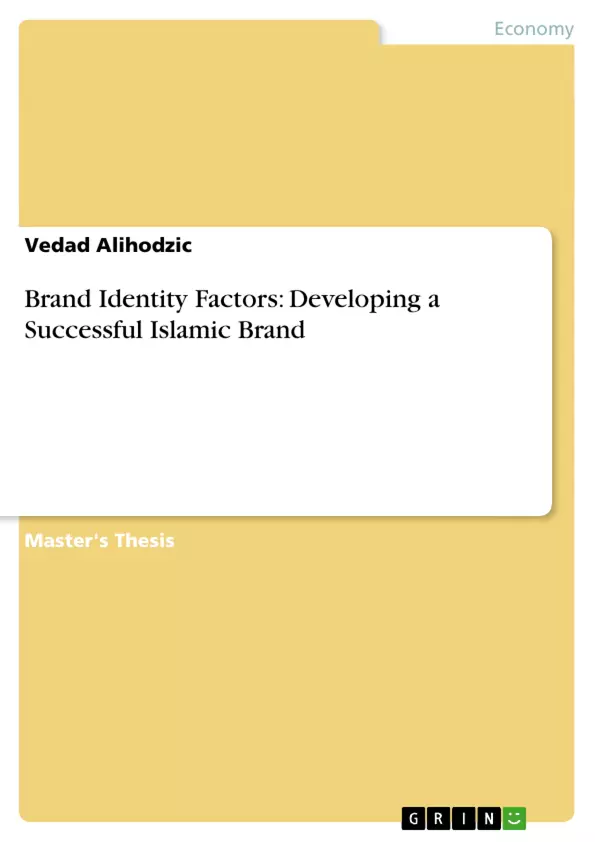The market for Islam-compliant products is getting highly important, due to the high impact of religious obligation on Muslim consumer behaviour. No research is conducted on the question on how to create brand identity from a Muslim perspective in order to attract Muslim consumers. Therefore, this research aims to find a set of brand identity factors which can be used to create brands which are perceived as Islamic.
Based on relevant literature, eight factors were found to be relevant. This set of brand identity factors is verified through a mixed research approach. Interviews with experts on Islamic branding help to understand these brand identity factors from an expert point of view, whereas a survey verifies brand identity factors from
a consumer perspective.
Findings show that the tangible factor “Halal certificate” is the most important factor to perceive a brand as Islamic. Additionally, brand logo and brand name influence consumers’ perceptions. Intangible factors, such as brand values, brand origin and brand relationship, are also found to be important. Findings also show that
testimonials and brand slogan are not highly important.
Based on these findings, the Muslim Brand Identity Model has been developed which can be used to balance brand identity factors in order to create a successful brand. It can be recommended to brand managers, consultancies and advertising agencies to ensure that the brand is strictly following Islamic standards and regulations
in order to be successfully perceived as Islamic.
Inhaltsverzeichnis (Table of Contents)
- Chapter 1 Introduction
- 1.1 Importance of the topic
- 1.2 Aims and Objectives for the Dissertation
- 1.3 Topic Overview
- 1.4 Hypothesis
- 1.5 Summary
- Chapter 2 Contextual Background
- 2.1 Introduction
- 2.2 The influence of Islam on consumer behaviour
- 2.3 The concept of Halal
- 2.4 The consumer perspective
- 2.4.1 The “new” Muslim consumer perspective
- 2.4.2 The non-Muslim consumer perspective
- 2.5 Principles in Islamic branding and marketing
- 2.6 Conclusion
- Chapter 3 Literature Review
- 3.1 Introduction
- 3.2 Conceptual framework
- 3.3 Consumer Behaviour
- 3.3.1 Motivation
- 3.3.2 Perception
- 3.3.3 Attitudes
- 3.4 Brand Identity
- 3.4.1 Intangible brand identity factors
- 3.4.2 Tangible brand identity factors
- 3.5 Marketing communication
- 3.6 Conclusion
- Chapter 4 Methodology
- 4.1 Introduction
- 4.2 Research Philosophy and Design
- 4.3 Research Methods
- 4.4 Sampling
- 4.5 Questionnaire design
- 4.6 Piloting
- 4.7 Data Analysis
- 4.8 Reliability and Validity
- 4.9 Ethical Considerations
- 4.10 Research Limitations
- 4.11 Conclusion
- Chapter 5 - Findings and Discussion
- 5.1 Introduction
- 5.2 Findings in Consumer Behaviour
- 5.3 Findings on Brand Identity
- 5.3.1 Brand origin
- 5.3.2 Brand values
- 5.3.3 Brand personality
- 5.3.4 Brand relationship
- 5.3.5 Brand logo
- 5.3.6 Brand name
- 5.3.7 Brand slogan
- 5.3.8 Testimonial
- 5.4 Conclusion
Zielsetzung und Themenschwerpunkte (Objectives and Key Themes)
This research aims to identify and understand brand identity factors that contribute to the perception of a brand as Islamic, particularly among Muslim and non-Muslim consumers. The research explores how these factors influence consumer behavior and perception towards Islamic brands.- The impact of religious obligations on Muslim consumer behavior
- The role of brand identity in creating successful Islamic brands
- The influence of tangible and intangible brand identity factors on perception
- The development of a Muslim Brand Identity Model to guide brand management
- The application of research findings for brand managers, consultancies, and advertising agencies
Zusammenfassung der Kapitel (Chapter Summaries)
- Chapter 1: Introduction provides an overview of the research topic, its significance, and the objectives of the dissertation. It also introduces the research hypothesis.
- Chapter 2: Contextual Background explores the influence of Islam on consumer behavior, the concept of Halal, and the perspectives of both Muslim and non-Muslim consumers. It also discusses principles in Islamic branding and marketing.
- Chapter 3: Literature Review presents a comprehensive review of existing literature on consumer behaviour, brand identity, and marketing communication. It develops a conceptual framework to connect relevant theories and concepts.
- Chapter 4: Methodology outlines the research design, methods, sampling, and data analysis procedures. It also discusses reliability, validity, ethical considerations, and limitations of the research.
- Chapter 5: Findings and Discussion presents the findings of the research, focusing on consumer behavior and the influence of various brand identity factors. It discusses the key findings in relation to brand origin, brand values, brand personality, brand relationship, brand logo, brand name, brand slogan, and testimonials.
Schlüsselwörter (Keywords)
The study focuses on the intersection of branding, Islamic values, and consumer behavior. Key keywords include Islamic brand identity, Muslim consumer behaviour, Halal certification, brand perception, brand values, and Islamic marketing. The research aims to understand the factors that influence the perception of Islamic brands and provide insights for successful brand management within the context of Islamic principles and consumer preferences.Frequently Asked Questions
What is the most important factor for a brand to be perceived as Islamic?
According to the research findings, a "Halal certificate" is the most crucial tangible factor for consumers to perceive a brand as Islamic.
Which intangible factors influence Islamic brand identity?
Key intangible factors include brand values, brand origin, and the relationship the brand builds with its consumers.
Do brand logos and names matter in Islamic branding?
Yes, the research indicates that both the brand logo and the brand name significantly influence consumer perceptions of how "Islamic" a brand is.
What is the 'Muslim Brand Identity Model'?
It is a model developed in this study to help brand managers balance various identity factors to create a successful brand that resonates with Muslim consumers.
Are testimonials and slogans effective for Islamic brands?
The study suggests that testimonials and brand slogans are not considered highly important by consumers for perceiving a brand as Islamic.
- Quote paper
- Vedad Alihodzic (Author), 2012, Brand Identity Factors: Developing a Successful Islamic Brand, Munich, GRIN Verlag, https://www.grin.com/document/196061



